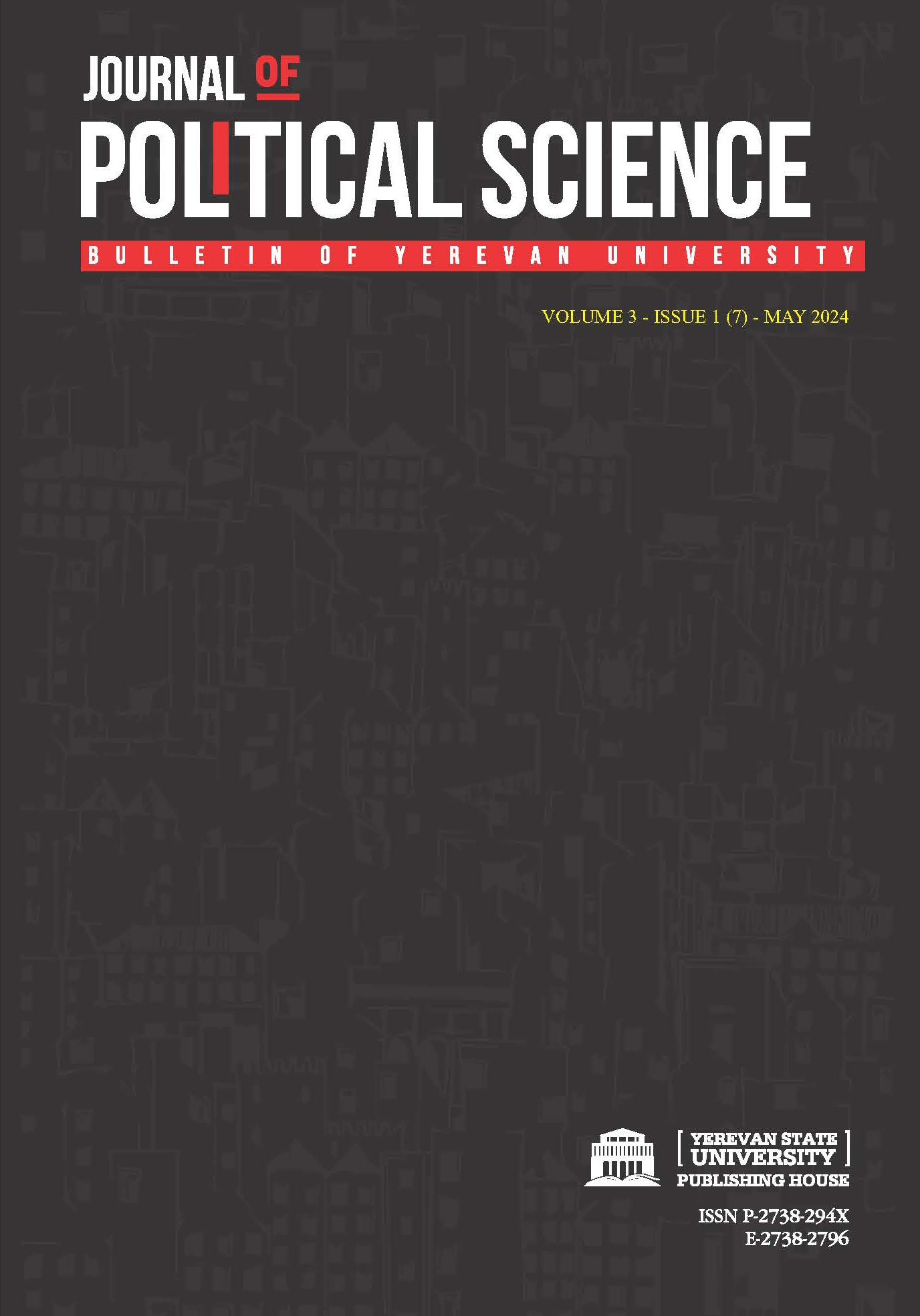Dimensions of the Shadow Reforms of Yuri Andropov’s Bureaucratic Management: Lessons from the Myths of the Totalitarian Leadership of the USSR
DOI:
https://doi.org/10.46991/JOPS/2024.3.7.101Keywords:
Sovietology, Soviet society, Andropov, USSR, state power, KGB, communist party, corruption, reforms, post-Soviet RussiaAbstract
The article discusses the issue of bureaucratic leadership and economic reforms in the USSR during the administration of Yu. V. Andropov, the General Secretary of the Communist Party of the Soviet Union. The article analyzes Andropov's consistent policy in the Soviet bureaucratic system and his uncompromising position in the fight against corruption. In this regard, the article emphasizes the years of his leadership, in which the reforms of the Soviet economy occupied a significant place, trying to inspire confidence in the Soviet society and citizens. However, the totalitarian regime of the USSR and the bureaucratic system simply blocked the package of measures proposed by the General Secretary.
An analysis of the works examining the personality and party and state activities of Yu. V. Andropov allows us to conditionally distinguish two periods of the formation and development of the historiography of the problem. The first, personifying the Soviet era, ended with the collapse of the Soviet Union in 1991. The second covers the 1990s, as well as the beginning of this century. Within the framework of the first period, the activities of Yu. V. Andropov were covered in various works devoted to the problems of modern Soviet history. Against this background, the position of Western researchers turned out to be preferable. In the West, the steady growth of interest in Yu. V. Andropov on the part of Sovietologists was mainly due to his activities as Chairman of the KGB. At the same time, it cannot be denied that, as a rule, the noted works were distinguished by their tendentiousness and bore the imprint of the Cold War.
References
Bennett, Simon. 2022. “System Reliability: A Cold War Lesson.” In: Disruption, Ideation and Innovation for Defence and Security. Advanced Sciences and Technologies for Security Applications, edited by Gitanjali Adlakha-Hutcheon, and Anthony Masys, 13-25. Springer, Cham. https://doi.org/10.1007/978-3-031-06636-8_2.
Brown, Archie. 1984. “The Soviet Succession: From Andropov to Chernenko.” The World Today 40 (4): 134-141.
Burns, John M. 1983. The emergence of Yuri Andropov. New York Times. April 29, 2024. https://www.nytimes.com/1983/11/06/books/the-emergence-of-yuri-andropov.html.
deGraffenried, Julie. 2023. Religion and Politics in the USSR: The Cold War Era. In: The Palgrave Handbook of Religion and State Volume II: Global Perspectives, edited by Shannon Holzer, 91-123. Palgrave Macmillan, Cham. https://doi.org/10.1007/978-3-031-35609-4_6.
Free Frank Warner. 2003. The Evil Empire speech: The full story of Reagan's historic address. April 29, 2024. https://frankwarner.typepad.com/free_frank_warner/2003/12/story_of_reagan.html.
Galushko, Artem. 2021. Origins of Communist Politically Motivated Criminal Justice. In: Politically Motivated Justice. T.M.C. Asser Press, The Hague, pp 65-137. https://doi.org/10.1007/978-94-6265-459-4_2.
Herman, Victor. 1983. “In Stalin's Footsteps: Yuri Andropov—Rise of a Dictator.” Imprimis 12 (9) (September). Accessed April 29, 2024. https://imprimis.hillsdale.edu/wp-content/uploads/2016/11/Imprimis-Yuri-Andropov-Rise-of-a-Dictator-Sept-1983.pdf.
International Institute for Strategic Studies. 1983. “Report by general secretary Yuri Andropov (excerpts) 21 December 1982: Taken from the Moscow home service version of 21 December 1982, translated by the BBC Monitoring Service. (SU/7215/C7–10).” Survival 25 (2): 87-88. https://doi.org/10.1080/00396338308442090.
Kramer, John M. 1977. “Political Corruption in the U. S. S. R.” The Western Political Quarterly 30 (2): 213-224. https://doi.org/10.2307/447406.
Krausz, Tamás. 2023. System Change and Property Relations: On Perestroika’s Historical Experiences. In: State Socialism in Eastern Europe: History, Theory, Anti-capitalist Alternatives, edited by Eszter Bartha, Tamás Krausz, and Bálint Mezei, 155-182. Palgrave Macmillan, Cham. https://doi.org/10.1007/978-3-031-22504-8_6.
Lomagin, Nikita, Irina Mironova, Maxim Titov, and Michael Oshchepkov. 2023. Coal in the Soviet Economy. In: Russian Coal in the Era of Climate Change. Palgrave Macmillan, Singapore, pp. 27-57. https://doi.org/10.1007/978-981-99-5370-7_2.
Manukyan, Armenak. 2022. “An Alternative to the Dissident Paradigm and Intersecting Civil Protests in Soviet Armenia: Equal But Different?” Journal of Political Science: Bulletin of Yerevan University 1 (3): 73-89. https://doi.org/10.46991/JOPS/2022.1.3.073.
Marxists Internet Archive. 1982. Sixtieth Anniversary of the Union of Soviet Socialist Republics. April 29, 2024. https://www.marxists.org/archive/andropov/1982/andropovanniversaryussr.pdf.
Marxists Internet Archive. 1983a. “Reply to an American School Girl.” April 29, 2024. https://www.marxists.org/archive/andropov/1983/april-19.htm.
Marxists Internet Archive. 1983b. “Statement at the Plenary Meeting of the CPSU Central Committee.” April 29, 2024. https://www.marxists.org/archive/andropov/1983/andropov-1.pdf.
Marxists Internet Archive. 1983c. “Resolution of the USSR Supreme Soviet On the International Situation and the Foreign Policy of the Soviet State.” April 29, 2024. https://www.marxists.org/archive/andropov/1983/andropov-2.pdf.
National Security Archive. 1981. KGB Chairman Yuri Andropov at the National Consultation Meetings of the Leadership and Members of the KGB, “On the Tasks of the KGB in Light of the Decisions of the 26th Congress of the CPSU,” May 25, 1981, Top Secret. April 29, 2024. https://nsarchive.gwu.edu/document/17306-document-02-kgb-chairman-yuri-andropov.
National Security Archive. 1983. KGB Chairman Yuri Andropov to General Secretary Leonid Brezhnev, "Report of the Work of the KGB in 1981," May 10, 1982, and Victor Chebrikov to General Secretary Yuri Andropov, "Report of the Work of the KGB in 1982," March 15, 1983. April 29, 2024. https://nsarchive.gwu.edu/document/17307-document-04-kgb-chairman-yuri-andropov.
O’Riordan, Elspeth. 2023. The Superpowers and the End of the Cold War. In: Understanding the Cold War. Palgrave Macmillan, Cham, pp. 387-415. https://doi.org/10.1007/978-3-031-06075-5_16.
Olcott, Martha Brill. 1985. “Yuri Andropov and the ‘National Question.’” Soviet Studies 37 (1): 103-117.
Razzakov, Fedor I. 2009. The Corruption in the Politburo: the case of "the red Uzbek" (Korruptsiia v Politbiuro : delo "krasnogo uzbeka"). Moscow: EKSMO Algoritm.
Rothacher, Albrecht. 2021. From Alexander II to Gorbachev: The Economic History of Modern Russia. In: Putinomics. Springer, Cham, pp. 1–41. https://doi.org/10.1007/978-3-030-74077-1_1.
Sullivan, Charles J. 2022. The Politics of the Past and Present. In: Motherland. Palgrave Macmillan, Singapore, pp. 97-125. https://doi.org/10.1007/978-981-19-3975-4_6.
Downloads
Published
How to Cite
Issue
Section
License
Copyright (c) 2024 Gevorg Harutyunyan

This work is licensed under a Creative Commons Attribution-NonCommercial-ShareAlike 4.0 International License.







